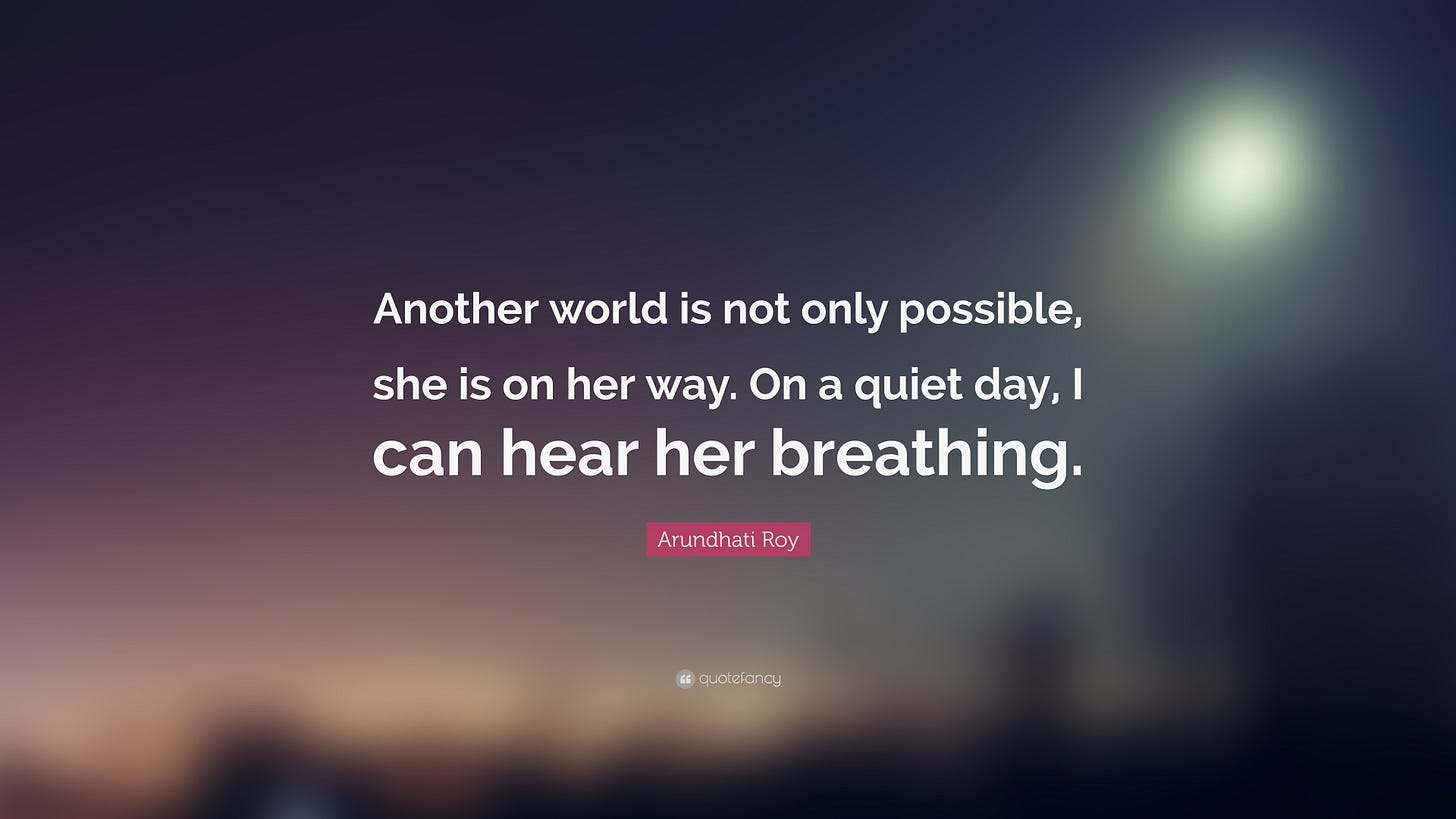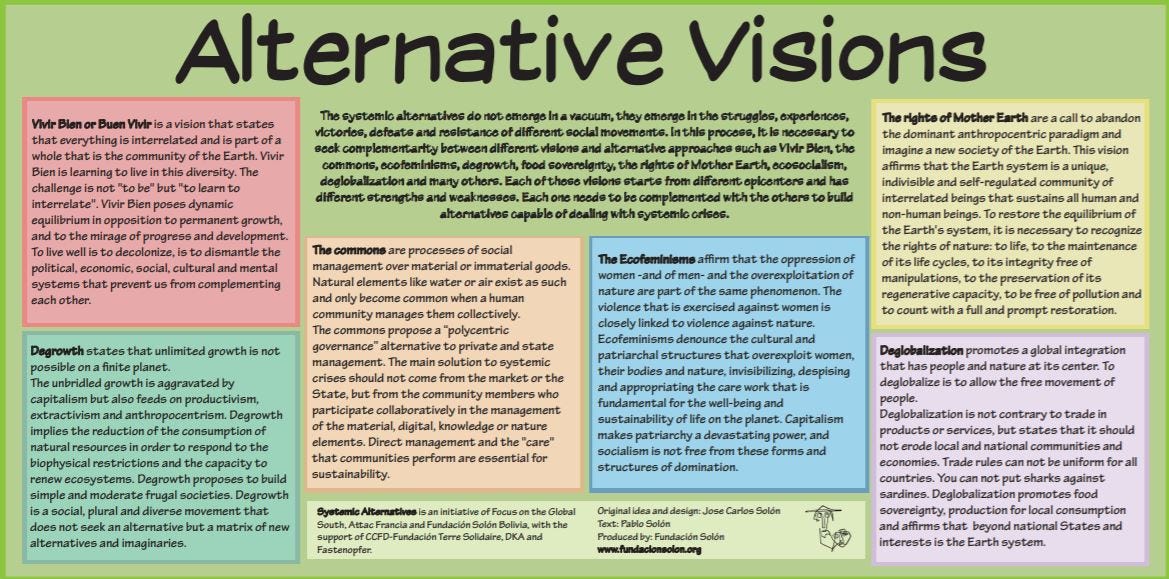Every year my three siblings and I (and our dogs!) gather for an annual camping trip; this year took us into the Marble Mountain Wilderness in northern California. I look forward to this trip every year: it’s a chance to talk about the things that matter, to push each other’s thinking, to connect.
This year I shared about my work, and one of our exchanges prompted this post. In my last post I talked about moving beyond binaries. They are paralyzing: they rob us of our capacity for imagination. Nowhere is that more evident to me today than in the false binary between capitalism and socialism.
1) First, some (grossly oversimplified) history. Neoliberalism - the form of corporate globalization that swept the globe in the 1980s and 90s - justified its ascendance in Margaret Thatcher’s famous words: “There is no alternative.”
Those most impacted fought back: the Zapatistas deliberately launched their resistance on the day NAFTA took effect in 1994 (I wrote about this history and its relationship to the present here). Others took up the banner, launching a global resistance movement via the World Social Forums by embracing a different vision: “Another world is possible.”
2) But of course it’s not only that another world (singular) is possible. Other worlds (plural) are possible. The singular reinforces the binary: it sets up a false dichotomy between capitalism and its presumed opposite (socialism), and stifles our imagination. I’m with the Rev. Dr. Martin Luther King, Jr., who memorably called for a “higher synthesis” to move beyond this paralyzing binary. Defining this synthesis is for me among the most urgent tasks of the moment: it requires radical imagination.
Without imagination we turn toward self-preservation and scarcity thinking: look no further than this astonishing article about billionaires retrofitting abandoned missile silos as luxury escape shelters in the face of coming system collapse.
3) David Bollier calls this the “war against the imagination”, and quotes poet Diane di Prima:
The war that matters is the war against the imagination
all other wars are subsumed in it….
the war is the war for the human imagination
and no one can fight it but you
and no one can fight it for you
The imagination is not only holy, it is precise
it is not only fierce, it is practical
men die everyday for the lack of it…
the ultimate famine is the starvation of the imagination.
I’m reminded here of John Lennon’s Imagine, which always struck me as so beautifully simple… and so breathtakingly radical. I increasingly find myself drawn to those people doing this work now.
4) adrienne maree brown - who is in my view the foremost sage of our times - is at the vanguard of those experimenting with “radical imagination.” Her work highlighting black futurists and building on science fiction writers starts from this premise: we need to imagine a world we’ve never seen. I love this beautiful reflection from CompassPoint, on the relationship between radical imagination and social movements in manifesting the future we so urgently need:
Social movements are powered in no small part through radical leaps of imagination: a building of a collective narrative of a world none of us have lived in, but long for.
5) The Sunrise Movement has been among the best I’ve seen at applying this insight in the political sphere: the bold vision behind the Green New Deal has already shifted the entire political discourse around the climate crisis here in the U.S. Kate Aronoff had a great essay in the Intercept describing a day in the future, and it sounds awesome; who doesn’t want this?
IT’S THE SPRING of 2043, and Gina is graduating college with the rest of her class. She had a relatively stable childhood. Her parents availed themselves of some of the year of paid family leave they were entitled to, and after that she was dropped off at a free child care program.
Pre-K and K-12 were also free, of course, but so was her time at college, which she began after a year of public service, during which she spent six months restoring wetlands and another six volunteering at a day care much like the one she had gone to.
I already hear you formulating counter-arguments (but how will we pay for all that?) Fight that instinct! Our brains and our attention are precious resources: let’s devote our mental energy to creating the future we need, not conjuring arguments for why we can’t. Jason Hickel and Martin Kirk offer this counsel: “Don’t be scared about the end of capitalism—be excited to build what comes next.” People are already taking up that challenge; I take inspiration from the UK’s Imagine 2027 effort as but one illustrative example.
Sunrise gets the need for radical imagination: take a look at this video and tell me you aren’t moved.
6) This work is global, and often emerging from the global South: I love the “systemic alternatives” highlighted by Pablo Solon (this is a great introduction to various frameworks for re-conceiving how we organize ourselves at global scale).
7) While many manifestations of radical imagination are at the level of global economic systems (of necessity in the face of our climate crisis), the same principles apply everywhere. My Colombian Lyft driver to the airport this morning had a great line lamenting our supposed lack of options with regard to the Venezuela crisis:
They say “all options are on the table.” We have economic sanctions, and the possibility of military intervention… that must be a very small table!
That’s the point. If we can land a man on the moon, surely human ingenuity can do better.
8) So let me close by naming two domains of action currently pushing me to expand my own imagination in new and mind-bending ways:
I’m really excited by the whole movement around prison abolition, challenging us to imagine a world beyond a carceral state. Mariame Kaba’s work in particular I find really powerful; this interview with Chris Hayes is so good. I also commend this feature piece on Ruth Wilson Gilmore, posing the provocative question “is prison necessary?”
The other space that’s blowing my mind right now is thinking beyond the nation-state (an earlier post cited Rana Dasgupta’s work on this). John Washington posed the question “What would an open-borders world actually look like?” It’s an even bigger question than that, of course: it invites us to contemplate new forms of community, of organization, of global governance. This discussion is closely linked to movements toward decolonization (indigenous people offer us a very different - and in my view far more attractive - vision for our relationship to land and place). As with many of these movements (see prison abolition), it’s often women of color and indigenous people at the forefront. See this great passage from Harsha Walia’s Beyond Border Imperialism:
All movements need an anchor in a shared positive vision, not a homogeneous or exact or perfect condition, but one that will nonetheless dismantle hierarchies, disarm concentrations of power, guide just relations, and nurture individual autonomy alongside collective responsibility.
I’d love to hear about where you’re seeing radical imagination right now, and how you’re thinking about the possibilities of this moment. For my next post: a vision is good, but how do we get there from here? (Imagination is not enough…)


